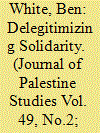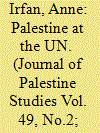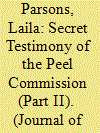|
|
|
Sort Order |
|
|
|
Items / Page
|
|
|
|
|
|
|
| Srl | Item |
| 1 |
ID:
172908


|
|
|
|
|
| Summary/Abstract |
In response to growing Palestine solidarity activism globally—and particularly in countries that have been traditional allies of Israel—the Israeli government has launched a well-resourced campaign to undermine such efforts. A key element of this campaign consists in equating Palestine advocacy; the Boycott, Divestment, Sanctions (BDS) movement; and anti-Zionism with anti-Semitism. The concerted effort to delegitimize solidarity with the Palestinians is taking place even as genuine anti-Semitism is on the rise, thanks to the resurgent white nationalism of the Far Right in Europe and North America—political forces that Israel is harnessing to help shield from scrutiny and accountability its apartheid policies toward Palestinians, both citizens of the state as well as those under military rule. In its efforts to conflate anti-Zionism with anti-Semitism, the Israeli government is assisted by non-state organizations that nonetheless enjoy close ties with the state and its agencies.
|
|
|
|
|
|
|
|
|
|
|
|
|
|
|
|
| 2 |
ID:
172907


|
|
|
|
|
| Summary/Abstract |
The Dead Sea, the lowest point on Earth, is one of the natural wonders of the world. Rich in minerals and salt, the lake has attracted visitors for millennia, and the economic value of its mineral riches has been important to both the local Palestinian population and to every colonial power that has ruled the area. Today, Israel exercises total control over the Dead Sea, the northern basin of which lies in the occupied Palestinian territories. Israeli settlements and international businesses, aided by state-funded initiatives, have established a profitable tourism sector and extractive industries based on the Dead Sea's natural resources, while Palestinians remain effectively excluded from pursuing such opportunities. Qumran National Park, private beach resorts, and the cosmetics company AHAVA, among others, reap enormous profits from settlements in the Dead Sea area, benefiting from Israel's occupation and unlawful policies and helping to drive a self-serving narrative of the area's history.
|
|
|
|
|
|
|
|
|
|
|
|
|
|
|
|
| 3 |
ID:
172910


|
|
|
|
|
| Summary/Abstract |
This remembrance commemorates the life of Kamal Boullata, an influential Palestinian artist and art historian from Jerusalem. In it, the artist Bashir Makhoul discusses Boullata's influence on his own art's connection to Palestinian history and identity.
|
|
|
|
|
|
|
|
|
|
|
|
|
|
|
|
| 4 |
ID:
172906


|
|
|
|
|
| Summary/Abstract |
This article examines the relationship of the Palestine Liberation Organization (PLO) to the United Nations Relief and Works Agency for Palestine Refugees in the Near East (UNRWA) during the 1970s, the period when the PLO reached the zenith of its power in Palestinian refugee camps throughout the Levant. Based on archival United Nations (UN) and UNRWA documents, as well as the PLO's own communications and publications, the article argues that the organization approached its relationship with UNRWA as part of a broader strategy to gain international legitimacy at the UN. That approach resulted in a complex set of tensions, specifically over which of the two institutions truly served and represented Palestinian refugees. In exploring these tensions, this article also demonstrates how the “question of Palestine” was in many ways an international issue.
|
|
|
|
|
|
|
|
|
|
|
|
|
|
|
|
| 5 |
ID:
172905


|
|
|
|
|
| Summary/Abstract |
This is the second installment of a two-part article on the recently released secret testimony to the Peel Commission. Part I (JPS 49, no. 1) showed how the secret testimony deepens our understanding of the structural exclusion of the Palestinians from the Mandate state. Part II now focuses on what the secret testimony reveals about the Peel Commission's eventual decision to recommend partition. It turns out that Zionist leaders were less central to this decision than scholars have previously assumed, and that second-tier British colonial officials played a key role in the commissioners' partition recommendation. British decision-making over the partition of Palestine was shaped not only by a broad ambition to put into practice global-imperial theories about representative government and the protection of minorities; it also stemmed from a cold-eyed self-interest in rehabilitating the British reputation for efficient colonial governance—by terminating, in as deliberate a manner as possible, a slack and compromised Mandatory administration.
|
|
|
|
|
|
|
|
|
|
|
|
|
|
|
|
| 6 |
ID:
172909


|
|
|
|
|
| Summary/Abstract |
Andrew Ross's Stone Men: The Palestinians Who Built Israel is a significant contribution to an emerging literature on Palestinian labor. Through an examination of various facets of the stone industry in both Israel and the West Bank, Ross develops a series of insights into the nature of settler colonialism, patterns of urban development, the political economy of Palestinian class formation, borders and migration, and the ecological impacts of occupation. By highlighting the ways in which Palestinians actually built Israel, Ross's book carries important implications for how we think about Palestinian political strategy and the debates around one- or two-state solutions.
|
|
|
|
|
|
|
|
|
|
|
|
|
|
|
|
|
|
|
|
|